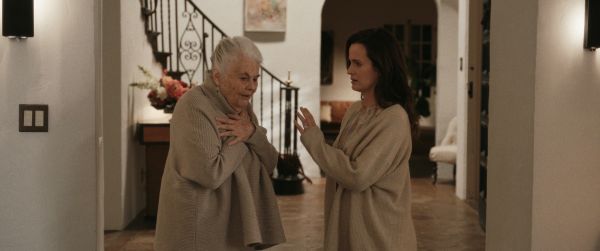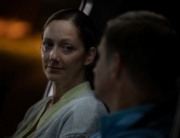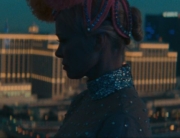
Ida Lupino was never a neutral presence on the screen. She was always specific, spiky, and alive. Yet so many of the films she was in were not as good as she was. Going through her movies is not only a reminder of how frequently a great actor is at the mercy of less-than-great films, but also an experience of repeatedly hoping that a disappointing film will change course the moment she enters.
Why do I bring this up before a review of The Uninvited, a new film by writer/director Nadia Conners?
The film opens with preparations for a ritzy party in the Hollywood Hills. Rose (Elizabeth Reaser), one of the hosts, stands in front of a mirror, talking to herself about her aging face. Sammy (Walton Goggins), her husband, enters in a bluster, and they engage in the kind of disillusioned banter typical of a struggling marriage. He is a talent agent; she is an actress who once had a lively career but is no longer getting cast. Their child is upstairs with the babysitter. Neither of them seems especially happy about this party, even if some big names are on the way and, for Sammy at least, some important, career-determining conversations are to be had.
The dialogue here is broad, stilted, and unconvincing. The screenwriter creates tension by making the characters argue and seems to have no other techniques at her disposal. The characters themselves come across as surface-level types—caricatures of an upper-class, bickering married couple.
Then, a glimmer of hope arrives in the form of Lois Smith, driving a Prius up the couple’s driveway. Smith plays Helen, a confused older woman who is convinced she’s arrived at her home, and at the same time is baffled by her surroundings. Rose gets her out of the car to help her, much to Sammy’s impatience.
Smith, like Ida Lupino, is one of the greats. With a career that extends as far back as East of Eden, she has distinguished herself on both stage and screen with remarkable range, emotional depth, and the precision and perception her scripts require. From the first moment we see her sitting at the wheel, she captivates the viewer’s attention with her sense of clarity, reality, and focus—even as she portrays a person whom clarity and focus have abandoned. For a moment, it seems we might be about to enter a much more exciting film.
Alas, there is no such luck.
The Uninvited takes place over the course of a single night. Theoretically, this is a night of complete chaos. Helen experiences a form of dementia, and the only friend available to pick her up lives all the way in La Jolla. Rose’s former lover (Pedro Pascal) shows up and does not seem content to leave their affair in the past, nor is Sammy fully capable of stifling his jealousy. Meanwhile, Sammy’s plans to pitch a great new venture to a big-time client, Gerald (Rufus Sewell), crash embarrassingly. None of this is to mention that Helen does not exactly stay in one place for the whole night.
And yet, it’s all both trite and tidy. The film overflows with convenient realizations about aging, missed opportunities, being true to oneself, and the like—it feels like a disguised self-help book. One especially cringe-worthy story about a fish is used as a heavy-handed metaphor throughout. Scarcely a single thread is developed enough to gain poignance, and yet all of them are wrought with such dutiful, writing-manual-style coherence that they feel unadventurous.
Though Helen’s arrival is presumably the event that sets the plot in motion, she is kept somewhat at arm’s length throughout. This is telling—not only because it deprives us of seeing more of Smith’s acting, but because it fails to allow her presence to really transform the movie.






Leave A Comment